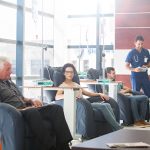-
Forward Look
AI Tool Could Improve Brain Tumor SurgeryAn advanced artificial intelligence tool helps surgeons accurately diagnose pediatric brain tumors during surgery.
by Carolyn Bernhardt
-
Forward Look
Non-surgical Options in Bladder CancerSome people with muscle-invasive cancer can forgo bladder removal surgery.
by Darcy Lewis
-
From the Editor-in-Chief
Early-onset Colorectal Cancer on the RiseResearchers search for reasons for the growing number of cases in people under 50.
by William G. Nelson, MD, PhD
-
Empowering Pediatric Cancer Patients
After twice being treated for leukemia as a child, Brady Lucas discusses the mental impact of pediatric cancer.
by Suzanne McBride
-
Light at the End of the Tunnel for ASPS Patients
Immunotherapy has helped some young people with alveolar soft part sarcoma (ASPS), a rare cancer, but there’s more work to be done.
by Kyle Bagenstose
-
CAR T-cell Therapy: Understanding the Warning and the Risks
The FDA requires a warning with CAR T-cell therapies about an increased risk of cancer from the treatment. Should you be concerned?
by Sandra Gordon
-
Overcoming Lung Cancer Stigma With Understanding
Shirley Muñoz wants to use her experience as a younger lung cancer patient to break down barriers to care for her community through translation and advocacy.
by Cameron Walker
-
Real-world Outcomes in Multiple Myeloma
Study shines a light on the differences in outcomes between clinical trial patients with multiple myeloma and those receiving cancer treatment in their community.
by Sandra Gordon
-
Some Breast Cancer Patients May Safely Skip Radiation
Three presentations at SABCS in December find that it may be safe in certain cases for people with breast cancer to go without radiation.
by Cancer Research Catalyst
-
Emerging Treatments for Brain Metastases in Breast Cancer
SABCS panel describes advances and pivotal questions in managing patients whose breast cancer has metastasized to their brain.
by Marci A. Landsmann
Cancer Talk
At-home Prostate Cancer Test May Help Some Men Avoid Biopsy
The test, which analyzes urine for 18 cancer-specific genes, ruled out the need for biopsy in men with elevated PSA without a digital rectal exam.
by Sandra Gordon
The Power of ComedyIn a new play, the pain of cancer can be a chance to laugh.
by Ashley P. Taylor
Melanoma Risk in Childhood Cancer SurvivorsPeople treated for childhood cancer found to have twice the risk of developing melanoma as an adult.
by Cameron Walker
Online Second OpinionsMore than half of patients who participated in a program offering online second opinions were recommended a change to their treatment plan.
by Eric Fitzsimmons















